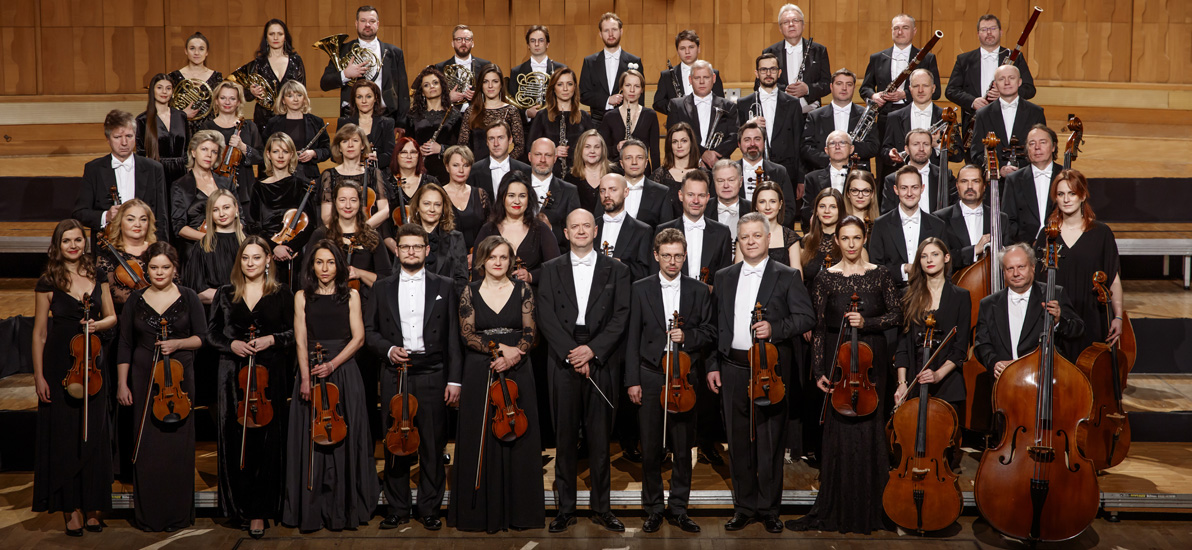Polish Radio Orchestra in Warsaw

The history of this orchestra dates back to 1934. Wishing to fill broadcasting time with music, and taking other European radio stations as a model, Polish Radio decided to set up its own choirs and ensembles, the most important of which became the Polish Radio Symphony Orchestra in Warsaw, created by Grzegorz Fitelberg. In forging the new orchestra’s repertoire, considerable emphasis was placed on documenting musical culture in all its dimensions: symphonic classics, stage music and new works. Thanks to exchanges with foreign broadcasters, the orchestra helped to promote Polish music on the international stage.
In 1945, following the turmoil of war, the conductor and violinist Stefan Rachoń established in Warsaw the Polish Radio Orchestra, and that is the moment when our ensemble’s history begins. Led by Rachoń, the orchestra not only organised concerts, but also made numerous recordings, including for Polish Television. For thirty years, the core repertoire was popular and light music. In the mid-seventies, crucial changes began to take place in the orchestra’s artistic profile. Włodzimierz Kamirski, who led the orchestra from 1976 to 1980, consistently introduced new repertoire, seeking to transform the ensemble into a symphony orchestra. His work was continued by Jan Pruszak (1980–1988) and Mieczysław Nowakowski (1988–1990). In 1990, under the direction of Tadeusz Strugała (1990–1993), the ensemble began rehearsals and concerts at its new home: Polish Radio’s Witold Lutosławski Concert Studio. During Wojciech Rajski’s stint as artistic director (1993–2006), the improved working conditions and lofty artistic standards enabled the orchestra to travel abroad, presenting mainly music by Polish composers. From 2007 to 2015 the orchestra was led by Łukasz Borowicz. Under his tenure, it became a tradition to launch the new artistic seasons with concert performances of unknown or forgotten Polish operas. They included Statkowksi’s Maria, Moniuszko’s Flis [The raftsman] and Verbum Nobile, Dobrzyński’s Monbar and Noskowski’s Zemsta za mur graniczny [Revenge for the boundary wall]. In 2015 Michał Klauza became the orchestra’s artistic director. The main strand to the work of this highly professional orchestra fulfils the fundamental mission of Polish Radio, namely, the promotion and popularisation of Polish music.
In keeping with a long-standing tradition, successive seasons have begun with concert performances, commissioned by Polish Radio 2, of vocal-instrumental works by Polish composers: Ogiński’s Zélis i Valcour, czyli Bonaparte w Kaire [Zélis and Valcour, or Bonaparte in Cairo], Nowowiejski’s Powrót syna marnotrawnego [Return of the prodigal son], Kurpiński’s Szarlatan, czyli wskrzeszanie umarłych [The charlatan, or raising the dead], Stanisław Moniuszko’s Hrabina [The countess] and Karol Szymanowski’s Hagith. The performance of this last work was recorded onto CD (for that album, the Polish Radio Orchestra in Warsaw received a Fryderyk 2020 award from the Polish record industry in the Album of the Year (Oratorio and Opera Music) category. Under the tenure of Michał Klauza, Polish Radio has also released the first ever recording of the symphonic works of Henryk Wars: Maalot, Szkice miejskie [Urban sketches], the Piano Concerto and Symphony No. 1. They were performed from the scores discovered by the composer’s widow Elżbieta Wars in the late 90s. In 2019 the ensemble recorded the masses of Stanisław Moniuszko, in keeping with the composer’s original notation, that is, with orchestra. For that CD, in December 2020, the Polish Radio Orchestra in Warsaw received the Phoenix Prize 2020 of the Association of Catholic Publishers in the Classical Christian Music category.
The Polish Radio Orchestra in Warsaw has been conducted with great success by such maestri as Jerzy Maksymiuk, Jacek Kaspszyk, Antoni Wit, Jan Krenz, Marek Moś, Mikhail Agrest and Daniel Raiskin, and it can boast excellent concert performances and recordings with outstanding soloists, including Iwona Hossa, Izabella Kłosińska, Aleksandra Kurzak, Olga Pasichnyk, Ewa Podleś, Jadwiga Rappé, Małgorzata Walewska, Piotr Beczała, Tomasz Konieczny, Mariusz Kwiecień, Artur Ruciński, Krzysztof and Jakub Jakowicz, Konstanty Andrzej Kulka, Rafał Blechacz, Charles Richard-Hamelin, Krzysztof Jabłoński, Piotr Paleczny and Dang Thai Son.
The last thirty years have seen the orchestra’s first disc recordings of Polish symphonic and operatic music, most often in connection with important anniversaries. For example, in the 2008/2009 season, Roman Statkowski’s opera Maria was revived and popularised. Over subsequent years, the orchestra also prepared contemporary premieres of other forgotten masterworks, such as Szymon Laks’s L’hirondelle inattendue and Ignacy Feliks Dobrzyński’s Monbar, czyli Filibusterowie [Monbar, or the filibusters]. To mark the centenary of the birth of Grażyna Bacewicz and the fortieth anniversary of her death, the orchestra recorded and released her three violin concertos and radio opera Przygoda króla Artura [King Arthur’s adventure]. Radio recordings of works by Andrzej Panufnik conducted by Łukasz Borowicz were released on four discs, and in January 2015 they were honoured with an International Classical Music Award, while a disc recorded with cellist Dominik Połoński received a Fryderyk award (2007).
Another important part of the orchestra’s work is performing light and film music. Over recent years, the Polish Radio Orchestra in Warsaw’s recordings have included Antoni Komasa-Łazarkiewicz’s music to Filip Bajon’s film Kamerdyner [The butler], the CD of which won a Fryderyk award in the Illustrative Music category (2019). For years now, the Polish Radio Orchestra in Warsaw has been giving concerts of film music, including thematic concerts and monographic concerts devoted to Wojciech Kilar and Hans Zimmer. The orchestra has performed many times at renowned festivals and competitions, such as the Witold Lutosławski ‘Chain’ Festival, La Folle Journée, the Beethoven Easter Festival, Witold Lutosławski International Cello Competition and Warsaw Autumn Festival of Contemporary Music.
On 29 May 2019, after three decades working under the name Polish Radio Orchestra, the ensemble returned to its historical name and is now known as the Polish Radio Orchestra in Warsaw. It is currently the only artistic ensemble within the structure of the national radio broadcaster Polskie Radio S.A.
